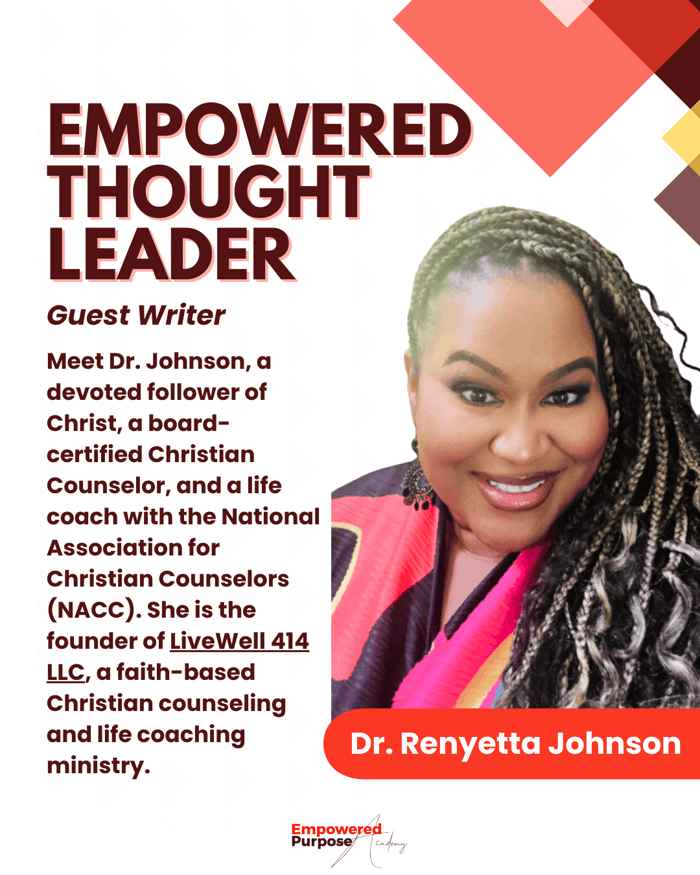Table of Contents
Finding Community and Navigating Mental Health as a Gen Z Christian Leader
Finding Community and Navigating Mental Health as a Gen Z Christian Leader
Blog by Dr. Renyetta Johnson
 The Gen Z generation is unique. Born between 1997 and 2012, they’ve grown up in a digital age, where information is at their fingertips, and social media plays a significant role in shaping their identities. At the same time, they are facing significant societal challenges—mental health issues are on the rise, and many feel disconnected, overwhelmed, and exhausted by the pressures of the world. For young Christian leaders in this generation, it’s not just about navigating life in a rapidly changing world; it’s about balancing their calling to serve others while caring for their mental health.
The Gen Z generation is unique. Born between 1997 and 2012, they’ve grown up in a digital age, where information is at their fingertips, and social media plays a significant role in shaping their identities. At the same time, they are facing significant societal challenges—mental health issues are on the rise, and many feel disconnected, overwhelmed, and exhausted by the pressures of the world. For young Christian leaders in this generation, it’s not just about navigating life in a rapidly changing world; it’s about balancing their calling to serve others while caring for their mental health.
Gen Z Christian Leaders are passionate, innovative, and ready to make a difference. However, leading others while managing personal struggles can sometimes feel daunting. Navigating these challenges involves a spiritual and emotional journey that requires intentionality, support, and self-care as a Christian.
Suppose you are a Gen Z Christian leader, or you know one. In that case, this blog will provide practical advice and spiritual encouragement on finding community and effectively managing mental health while serving others.
The Unique Pressures Faced by Gen Z Christian Leaders
Gen Z Christian leaders often carry the weight of both external expectations and internal pressures. They are passionate about their faith and feel called to lead. Still, life's challenges in this digital, hyper-connected age often make it feel like they are drowning under the weight of constant comparison, social pressure, and unrealistic expectations.
Some of the key pressures young Gen Z Christian leaders face include:
- Constant Connectivity: With social media, Gen Z leaders are constantly connected to their peers, followers, and a seemingly infinite number of opinions. This constant stream of information can lead to stress, feelings of inadequacy, and a lack of privacy.
- Navigating Cultural Shifts: This generation is experiencing significant cultural change, where traditional Christian values are often challenged. Gen Z leaders may feel a tension between staying true to their faith and engaging in a society that frequently promotes different ideologies.
- Mental Health Struggles: Gen Z has been called the "loneliest generation" as they experience higher levels of anxiety, depression, and loneliness than previous generations. As young leaders, they may feel isolated in their leadership journey, unsure of where to turn for support.
- Pressure to "Do It All": Young leaders often feel they must excel in every area—spiritually, academically, socially, and emotionally. They may also experience the need to always be strong for others, feeling pressure to appear perfect while silently struggling.
While these pressures are challenging, the good news is that with the right strategies and support, Gen Z Christian leaders can find the balance they need to serve effectively while protecting their mental health.
Finding Community: The Foundation for Healing and Growth
 One of the most critical aspects of navigating mental health and leadership as a Gen Z Christian leader is finding and investing in the community. The Bible is clear about the importance of community for growth and accountability. Ecclesiastes 4:9-10 states, "Two are better than one, because they have a good return for their labor: If either falls down, one can help the other up." This verse emphasizes the need for mutual support in our journeys.
One of the most critical aspects of navigating mental health and leadership as a Gen Z Christian leader is finding and investing in the community. The Bible is clear about the importance of community for growth and accountability. Ecclesiastes 4:9-10 states, "Two are better than one, because they have a good return for their labor: If either falls down, one can help the other up." This verse emphasizes the need for mutual support in our journeys.
Here’s how young leaders can cultivate a supportive, life-giving community:
- Build a Circle of Trusted Mentors
Mentorship is vital. No one can lead effectively without guidance, especially when facing the unique pressures of Gen Z leadership. Finding older, wiser Christians who have walked the leadership path can offer perspective, advice, and emotional support. Mentors can help young leaders see the bigger picture, reframe struggles, and provide encouragement. A mentor isn’t just someone who gives advice; they also pray with you, ask deep questions about your heart and spiritual life, and challenge you to grow. Having someone who has been through the ups and downs of ministry and life can help you avoid burnout and build resilience.
Participate in Small Groups
Small groups or Bible study groups can be powerful places for spiritual and emotional growth. As a Gen Z Christian leader, it might be tempting to isolate yourself, thinking that you need to handle everything on your own. However, engaging in a community where you can be real, ask questions, and share prayer requests can be incredibly healing.Be Vulnerable with Others
It’s easy to put on a brave face, especially when you’re in a leadership position. But true community is built on vulnerability and openness. Young Christian leaders should not be afraid to admit when they’re struggling—whether it’s with anxiety, loneliness, or doubts about their calling.Find Accountability Partners
Accountability partners are crucial for personal and spiritual growth. These are individuals who can ask you hard questions, pray for you, and help keep you accountable to your goals and values. Proverbs 27:17 says, "As iron sharpens iron, so one person sharpens another." Accountability is an essential part of maintaining a healthy, thriving leadership role.
Navigating Mental Health as a Young Christian Leader
Mental health affects people of all generations, but it has become incredibly prominent for Gen Z. As digital natives, they’re used to constantly being "on," which leads to issues like social media burnout, comparison, and the stress of trying to live up to an idealized version of themselves. As Christian leaders, it’s crucial to prioritize mental health so that we can serve effectively without neglecting our well-being.
Here are some ways to protect and nurture your mental health while leading:
- Prioritize Self-Care: Taking care of yourself physically, emotionally, and spiritually ensures you can lead others well. Remember that even Jesus took time to withdraw and pray (Mark 6:31).
- Engage in Regular Prayer and Meditation: Spending time daily in prayer and Bible reading helps ground you in God’s truth and brings peace to your heart. Philippians 4:6-7 encourages us to bring our anxieties to God in prayer.
- Seek Professional Help When Needed: If anxiety, depression, or other mental health struggles become overwhelming, don’t hesitate to reach out to a Christian counselor or therapist. Seeking professional help is a sign of strength, not weakness.
- Set Healthy Boundaries: Establishing boundaries in ministry work, personal life, and relationships will allow you to serve others without losing yourself in the process. Jesus himself set boundaries when he took time away from the crowds to rest and pray (Mark 1:35).
Conclusion
Young Gen Z Christian Leaders face challenges unique to their time, but these challenges are not insurmountable. By finding community, being vulnerable, prioritizing mental health, and seeking support when needed, Gen Z leaders can thrive in their callings and serve others effectively.
Leadership in today’s world requires strength, resilience, and self-awareness. As Christian leaders, we must not forget that our strength comes from God, and He desires for us to be whole, healthy, and thriving in our walk with Him. May you be encouraged to lean on God, lean on others, and take the necessary steps to care for your mental health while serving with passion and purpose.
Meet Dr. Renyetta Johnson

Dr. Renyetta Johnson is a devoted follower of Christ, a board-certified Christian Counselor, and a life coach with the National Association for Christian Counselors (NACC). As the founder of LiveWell 414 LLC, a faith-based Christian counseling and life coaching ministry, she is committed to helping individuals embrace healing and wholeness. Drawing from her personal journey of overcoming mental and emotional challenges through talk therapy and unwavering faith, Dr. Johnson takes a holistic, trauma-informed approach to supporting members of the Body of Christ.
A passionate mental health advocate, Dr. Johnson is dedicated to breaking the stigma surrounding mental health. She empowers individuals to grow through adversity, find strength in their faith, and move forward with Christ. Her mission extends beyond counseling—she is also a published author and the host of the LiveWell414 Podcast, where she shares biblical insights on mental and emotional well-being, offering encouragement and hope to believers.
Dr. Johnson has authored several impactful works, including Light A Fire: Cultivating, Rekindling, and Experiencing Spiritual Intimacy with a Holy God, The Light A Fire Prayer Journal, and When I Call Him: A 40-Day Prayer Journal for Mothers, all available on Amazon. She is deeply passionate about sharing the gospel of Jesus Christ and inspiring others to cultivate a deeper relationship with God. Fulfilling her Kingdom assignment with purpose and joy, she continues to equip and uplift others in their spiritual and emotional journeys.
Follow Dr. Johnson on Facebook to stay connected and be encouraged in faith and mental wellness!
FAQs
1. Why is it important to find community and navigate mental health for Gen Z Christian leaders?
Gen Z Christian leaders are navigating a rapidly changing world where they face immense pressures from social media, cultural shifts, and leadership expectations. Many experience loneliness, anxiety, and burnout due to the weight of leading while managing their own mental health struggles. Finding a strong community provides support, encouragement, and accountability, helping them stay grounded in their faith and leadership journey. Prioritizing mental health allows them to serve more effectively without compromising their well-being.
2. How can Christian leaders support Gen Z leaders in navigating mental health and finding community?
Christian leaders can support Gen Z leaders by fostering open conversations about mental health in the church, normalizing seeking help, and creating mentorship opportunities. Providing access to faith-based counseling, encouraging participation in small groups, and offering leadership development programs can also be beneficial. It’s important for older leaders to model vulnerability, demonstrating that it’s okay to seek help and take time for self-care.
3. What are practical ways to support Gen Z Christian leaders within the church community?
- Mentorship Programs: Pair Gen Z leaders with experienced mentors who can provide spiritual and emotional guidance.
- Small Groups & Peer Support: Encourage them to participate in or lead Bible study groups where they can connect with others.
- Workshops on Mental Health & Leadership: Host discussions and training sessions that address both spiritual and emotional well-being.
- Safe Spaces for Vulnerability: Create an environment where young leaders feel comfortable sharing their struggles without fear of judgment.
- Encourage Rest & Sabbath: Teach the importance of setting boundaries, taking breaks, and prioritizing spiritual renewal.
4. Can mental health and lack of community impact a Gen Z leader’s ability to serve their congregation?
Yes, poor mental health and a lack of community can significantly impact a leader’s effectiveness. Leaders who struggle with isolation, anxiety, or burnout may find it difficult to connect with their congregation, make sound decisions, or maintain the energy required for ministry. Without community support, they may feel overwhelmed and disconnected, making it harder to lead with confidence and clarity. Having a strong support system and prioritizing mental health helps them lead with wisdom, compassion, and endurance.
5. How does prayer help Gen Z leaders navigate their mental health?
Prayer is a powerful tool for mental and spiritual well-being. It allows Gen Z leaders to release their burdens to God, gain clarity, and find peace in His presence. Through prayer, they can seek divine wisdom, ask for strength during difficult seasons, and develop a deeper reliance on God rather than carrying the weight of leadership alone. Philippians 4:6-7 reminds us that bringing our concerns to God leads to a peace that surpasses understanding, which is essential for navigating the pressures of leadership.






